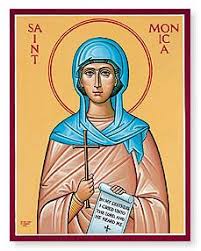HOMILY WEEK 21 02 – Year II
Standing Firm and Holding Fast:
Memorial of St. Monica
(2 Thes 2:1-3,14-17; Ps 96; Mt 23:23-26)
****************************************
There is a legend about St. Francis who when asked what he would do if Jesus was coming that day, replied that he would keep on hoeing in the garden.
In the readings today, St Paul invites us to do the same – to stand fast and hold firm in our faith.
Current doomsday and apocalyptic scenarios from time to time can be unsettling. How should we respond?
The first reading and the gospel combine to provide an answer. Jesus in the gospel chides the scribes and Pharisees for their hypocrisy and focus on external things instead of practicing justice, mercy and faith. He then invites them to clean the inside of the cup – to look within, repent, and go on a healing journey of conversion.
The first thing we need do is to hold fast to faith in God’s mercy and justice. That is our anchor. We need to believe in how much God loves us, and how merciful our God is. Pope Francis dwells on this. Rick Warren talks about how he used to watch his children sleep – their breathing, little chests going up and down. He derived pleasure just from watching his children sleep. They didn’t have to do anything – just be there, breathing and sleeping.
It is the same with God and us. We are God’s children. Imagine if you as parents love your children that way, unconditionally, without them having to do anything, how much more God loves us the same way. So, we must hold fast to God’s love and mercy, and be on healing journeys ourselves. Conversion is both a moment and a lifetime process. Justice for St Paul is a right relationship with God, others, ourselves and all of God’s creation. So, to hold fast to justice is to be sure that we are in a right relationship with God, an intimate relationship of loving obedience.
Second, we need to stand firm, trying our best to live the life that God has given us, doing God’s will, and not worrying about the future. God’s kingdom is at hand whether we are scrubbing pots, writing reports, driving carpools or hauling trash.
We need to develop our ability to find God in the normality of our everyday lives, and to live in the present moment. We need to be practicing mercy and acting justly in our world, especially by loving others – blessing, affirming, forgiving others – and working for justice, unlike the scribes and Pharisees.
Each day offers the opportunity to draw closer to God, to mend broken relationships, and to care for God’s people. If we are trying to do this each day, our fears and worries will dissolve. We will grow in confidence that we are living each day to its fullest, and we will be more peaceful.
In fact, we may even be able to live out the words of Psalm 96, and rejoice and exult for joy that Jesus is coming again to judge the peoples with equity, to judge the world with righteousness and the peoples with his truth.
 Today, the Church offers us St. Monica as a model “doer of the Word.” She was born in North Africa in 332 of Christian parents. At a young age, Monica was given in marriage to Patricius; they had three children. Patricius criticized his wife’s piety and her generosity to the poor, but was always respectful of her person. Monica’s influence was such that both her husband and mother-in-law converted to Christianity. In 371, a year after his baptism, Patricius died. Monica then devoted herself to the conversion of her son Augustine, who had abandoned his Christian faith.
Today, the Church offers us St. Monica as a model “doer of the Word.” She was born in North Africa in 332 of Christian parents. At a young age, Monica was given in marriage to Patricius; they had three children. Patricius criticized his wife’s piety and her generosity to the poor, but was always respectful of her person. Monica’s influence was such that both her husband and mother-in-law converted to Christianity. In 371, a year after his baptism, Patricius died. Monica then devoted herself to the conversion of her son Augustine, who had abandoned his Christian faith.
After 17 years of Monica’s persistent prayers Augustine was converted while in Milan, where he met Bishop Ambrose and returned to the faith. Mother and son enjoyed a close faith-based relationship from then on. Monica died during their return trip to Africa. She had said there was nothing left for her to do, all her hopes having been fulfilled. All we know about Monica comes from Augustine’s Confessions. In the tenth chapter of Book IX, he describes a spiritual experience they shared near the end of her life, and he always remembered his mother’s efforts on his behalf. She is patron saint of mothers, and a great model for us of strong faith and great compassion.
The Eucharist is in its own way, an experience of holding fast to God’s love though Word and Sacrament, and standing firm in our commitment to be bread to the world.
May our celebration be truly an experience of holding fast to God’s love and mercy, and standing firm in our commitment to love one another and the world as Jesus has loved us.



